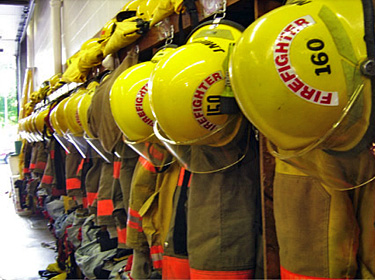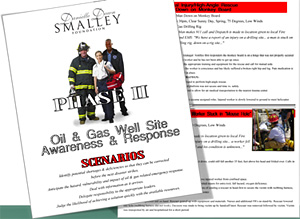First Responders

Firefighters, sheriffs’ departments, EMTs and 911 dispatchers may lack adequate training for oil-and-gas-related emergencies. Yet these first responders face increasing challenges posed by newer methods of energy extraction and by infrastructure buildout.
 Anticipate the Foreseeable
Anticipate the Foreseeable
Firefighters, sheriffs’ departments, EMTs and 911 dispatchers may lack adequate training for oil-and-gas-related emergencies. That’s not their area of expertise. Yet first responders in rural areas face increasing challenges and concerns posed by newer methods of energy extraction and by infrastructure buildout.
Our program helps first responders anticipate the foreseeable while minimizing the unexpected consequences of drilling incidents.
Overview
First responders in shale areas face increasing community pressure and challenges. New issues related to drilling, pipeline construction and easement agreements add to an already complex set of environmental, safety-and-awareness and economic concerns. Energy extraction and infrastructure build-out phase present multiple challenges to first responders unfamiliar with drilling activity.
Phase One
A major part of the Smalley Foundation’s outreach is building relationships with first responders who respond to drilling incidents. This program educates them about drilling operations, trucking traffic, oil & gas terminology and slang, and drilling site layout. Armed with this knowledge, first responders can make better choices in the face of new, and unique challenges. First responders lean about:
- Drilling operations
- Trucking traffic
- Oil and gas terminology, industry terms, slang
- Drilling site layout
- Unique equipment and environment
- Potential injuries that can occur
Phase Two
 First responders engage in role-playing using scenarios based on actual incidents. Phase Two teaches appropriate response techniques and how-to’s for using protective- and response-equipment. Included in the curriculum is how to:
First responders engage in role-playing using scenarios based on actual incidents. Phase Two teaches appropriate response techniques and how-to’s for using protective- and response-equipment. Included in the curriculum is how to:
- Identify potential shortages and deficiencies so they can be corrected before disaster strikes.
- Anticipate the hazard, vulnerability and impact of oil-and-gas related emergency response.
- Deal with information as it arrives.
- Delegate responsibility to the appropriate leaders.
- Judge the likelihood of achieving a solution quickly using available means.
Contact Us
Contact us for more information about how first responders can learn about safety and awareness around oil and gas drilling operations or for assistance reviewing your existing safety procedures related to oil-and-gas drilling equipment near your community.
